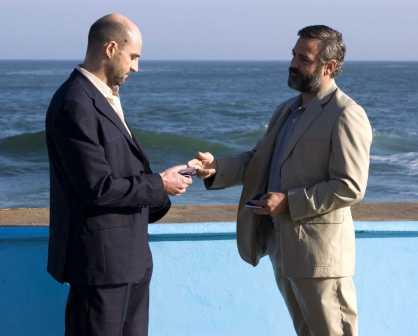File this one next to Red Scorpion: The Boston Globe uncovers that, among Casino Jack’s various other projects, Abramoff wanted to dig for oil in Israel, and had established a company, First Gate Resources, with some Russian investors to do so. It seems these investors, “energy company executives of a Moscow firm called Naftasib,” may also have paid for a 1997 DeLay-Abramoff boondoggle to Moscow. Also, the Feds “have sought information about Naftasib’s interest in congressional support for Russian projects financed through the International Monetary Fund.” The plot thickens…
Tag: Energy
Photo-Opportunities.
Need a job? Just get in-between Dubya and his new talking points. “The Energy Department said it has come up with $5 million to immediately restore jobs cut at a renewable energy laboratory President George W. Bush will visit on Tuesday, avoiding a potentially embarrassing moment as the president promotes his energy plan.“
SOTU ’06.
A quick note on Tuesday’s State of the Union: I actually think Dubya has delivered some well-crafted speeches (1/23) in the past, even if I disagree with almost all of their content. This wasn’t one of them. Except for the “America is addicted to oil” line (which Jimmy Carter basically said over 25 years ago) and the “human-animal hybrid” goofiness (which, as Crooked Timber points out, might mean trouble for diabetics), there wasn’t a single memorable moment throughout, just more of the same “9/11” and “freedom, yeah” grandstanding. (And Kaine was no better — I like to think I’m more interested in politics than most people, and I was bored stiff after a minute or two. Nice fireplace, tho’.) If the White House was looking for this address to reverse their ailing fortunes, a la Clinton in ’98, my guess is that they failed. (Pharyngula link via Now This.)
ANWR’s Nine Lives.
“The legislation would allow states to impose new fees on Medicaid recipients, cut federal child support enforcement funds, impose new work requirements on state welfare programs and squeeze student lenders.” Although a tie-breaking vote by Cheney got the deficit bill passed — meaning people on Medicaid, welfare recipients, and students with loans will soon be paying for Dubya’s millionaire tax breaks — the Dems do succeed in beating back ANWR drilling, much to the chagrin of Ted Stevens, who gambled that the Senate wouldn’t vote down a defense bill.
Ice Station Dubya.
Off again, on again: Along with a smattering of Operation Offset-type cuts (particularly with regard to student loans), “Bridge to Nowhere” Ted Stevens and the GOP attach ANWR drilling to a fiscal defense bill, in effect daring the Dems to vote against supporting the troops. Is this ANWR’s last stand? Update: Senate Dems ready for a fight.
The Oil Down the Desert Way.
 While perhaps a bit too dry and convoluted for some tastes, Stephen Gaghan’s Syriana is, IMHO, a top-notch political thriller that’s easily one of the best films of the year. Admitedly, the movie is missing some of the Soderberghian visual flourishes that made the very similar Traffic so memorable, and the movie definitely can be tough to follow. But, in a way, that’s part of its charm — Like the film’s protagonists, we only occasionally glimpse the shadowy tendrils of the beast that is Big Oil, and come to share their despair that it can ever be subdued. In sum, like the other recent Clooney outing, Good Night, and Good Luck, Syriana is both an intelligent, compelling work of cinema and a enthralling piece of social commentary, one that not only feels pertinent but necessary.
While perhaps a bit too dry and convoluted for some tastes, Stephen Gaghan’s Syriana is, IMHO, a top-notch political thriller that’s easily one of the best films of the year. Admitedly, the movie is missing some of the Soderberghian visual flourishes that made the very similar Traffic so memorable, and the movie definitely can be tough to follow. But, in a way, that’s part of its charm — Like the film’s protagonists, we only occasionally glimpse the shadowy tendrils of the beast that is Big Oil, and come to share their despair that it can ever be subdued. In sum, like the other recent Clooney outing, Good Night, and Good Luck, Syriana is both an intelligent, compelling work of cinema and a enthralling piece of social commentary, one that not only feels pertinent but necessary.
As you probably know, the movie jetsets around the globe following several facets of the oil trade and its consequences. In Beirut, an aging, disgruntled CIA agent (a stout George Clooney, resembling in Stephanie Zacharek’s words a “depressed circus bear”) starts to ask questions above his pay-grade about the collateral damage from a recent operation. In Geneva, after a family tragedy, a fresh-faced energy analyst (Matt Damon) becomes consigliere to the ambitious heir (Alexander Siddig) of a Middle-Eastern emirate. In Washington DC, a resourceful lawyer (Jeffrey Wright) begins due diligence work on an merger between two oil firms (the smaller headed by Chris Cooper). And, on the oil fields themselves, an increasingly desperate Pakistani emigrant (Mazhar Munir) begins to contemplate drastic action to change his fortunes, and those of his family.
 Along the way, Syriana‘s narrative is further fractured by the comings and goings of other famous faces, including Amanda Peet as Damon’s suffering wife, William Hurt as another grizzled agency vet, Tim Blake Nelson as the poster child for Abramoff‘s America, and Christopher Plummer as an insider among insiders. But, even though Plummer comes closest to being the Cigarette Smoking Man of this particular conspiracy tale, Syriana doesn’t offer any quick fixes or easy answers to the often grim story that unfolds. Some of our heroes find redemption or closure, true, but others become resigned to their fate, or even corrupted. And, ultimately, there is no Big Reveal or cathartic Speaking-Truth-To-Power scene to offer solace to the audience — Instead, we’re confronted with a system that, for better or worse, lumbers on, oblivious to either the machinations or the protests of mere individuals.
Along the way, Syriana‘s narrative is further fractured by the comings and goings of other famous faces, including Amanda Peet as Damon’s suffering wife, William Hurt as another grizzled agency vet, Tim Blake Nelson as the poster child for Abramoff‘s America, and Christopher Plummer as an insider among insiders. But, even though Plummer comes closest to being the Cigarette Smoking Man of this particular conspiracy tale, Syriana doesn’t offer any quick fixes or easy answers to the often grim story that unfolds. Some of our heroes find redemption or closure, true, but others become resigned to their fate, or even corrupted. And, ultimately, there is no Big Reveal or cathartic Speaking-Truth-To-Power scene to offer solace to the audience — Instead, we’re confronted with a system that, for better or worse, lumbers on, oblivious to either the machinations or the protests of mere individuals.
Depressing, indeed, even despairing at times, this film still feels like a story that must be told. And while viewers may quibble with some of the details of Gaghan’s Tarbell-esque expose of the political economy of oil, hopefully most will agree: We need more movies like Syriana.
The Demise of Dubyanomics?
After some balking by GOP moderates — and a surprising defeat on a spending bill — yesterday, the House manages to pass their budget. Still, “Republicans salvaged the win this time only by jettisoning one of President Bush’s top domestic priorities, opening Alaska’s National Wildlife Refuge to oil drilling, then trimming planned cuts to food stamps, Medicaid and student lunch programs.” And, on the Senate side, GOP moderates not only joined Dems in preventing the renewal of Dubya’s capital gains and dividend tax cuts, but raised taxes on oil companies (which, of course, may prompt a Dubya veto.) Sure, there’s still a lot of lousy stuff in these bills, but it’s nice to see some of the central premises of Dubyanomics — soak-the-poor, cut the rich a break, a free ride for Big Oil — fall apart in a GOP-controlled Congress.
Slick.
Well, I guess that explains why the GOP didn’t swear ’em in. The Post obtains a smoking gun document that proves, contrary to their statements last week, big-time oil executives met with Cheney’s energy task force to determine the nation’s energy policy in 2001. No big surprise there — While Cheney has been trying to hide records of the meetings for years, we’ve known that 62 of 63 members of the task force had ties to the coal, nuclear, or oil industries, with nary an environmental group in sight. Plus, it was clear at the time that the final energy plan was tailored by Enron for Enron, and their ilk. Still, this does mean that Big Oil lied bald-faced to Congress (and specifically Sen. Frank Lautenberg, who asked them about this directly.) And, while perjury’s not on the table, “a person can be fined or imprisoned for up to five years for making ‘any materially false, fictitious or fraudulent statement or representation’ to Congress.”
Arctic Dreams.
Just as it seemed the Senate had decided its fate, ANWR gets a reprieve, thanks to House GOP moderates forcing the removal of arctic drilling from the budget bill. And it gets worse for the rabid right-wing: Not only are the same GOP moderates balking at some of the draconian cuts in this budget, but key Senators are now turning against extending Dubya’s millionaire tax breaks. Olympia Snowe (R-ME) has already registered her disapproval, and George Voinovich (R-OH) says: “I do not know how anyone can say with a straight face that when we voted to cut spending last week to help achieve deficit reductions we can now then turn around two weeks later to provide tax cuts that exceed the reduction in spending…That is beyond me, and I am sure the American people.” Update: The House GOP are forced to punt ’til next week, as they try to gather the requisite votes.
Exxtreme Unction.
In the political theater department, Congress invites the heads of five major oil companies to testify — not under oath — about their recent upsurge in profits and concerns about price gouging. (No questions, of course, about the huge subsidies and tax breaks the GOP have granted them of late.) “The hearing opened with Republicans refusing a request by Democrats that the five executives take an oath before testifying. That avoided an embarrassing photo akin to when tobacco executives raised their right hands at a 1994 congressional hearing and swore cigarettes were not addictive.”

